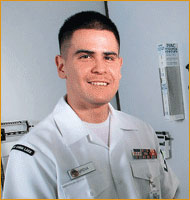2005 Sailor of the Year
winner

HM3 Victor Urena
20 years old. Purple Heart recipient. Veteran of 50 combat missions and 100 combat patrols in Iraq.
CHINA LAKE, Calif. - When Victor Urena enlisted in the Navy two years ago, he expected to train to become a hospital corpsman, then land at the Navy's base at China Lake so he wouldn't be far from his Downey, Calif., home.
But a conversation Urena had soon after boot camp showed him a new path, one that would take the sailor far from China Lake and onto the battlefields of Iraq.
Urena was waiting for the flight that would take him to Corpsman School when a first-class hospital corpsman approached him to chat. The younger sailor noticed a striking pin on the petty officer's chest.
"You want the FMF pin, you go green side," the petty officer told him of the pin designating him a Fleet Marine Force warfare specialist.
Urena's recruiter hadn't told him about the Navy's relationship with the Marine Corps. The petty officer "told me about the Marines — there's green side and there's blue," he recalled. The conversation "kind of motivated me."
Flash forward one year: Urena is "Doc" to a platoon of young Marine grunts. He's a Purple Heart recipient, a veteran of 50 combat missions and 100 combat patrols. Urena and "his" Marines were members of 2nd Battalion, 4th Marine Regiment — the "Magnificent Bastards" — the Corps' infantry battalion that suffered more casualties than any other in Iraq. His talents, training and courage helped save lives.
Urena could hardly know two short years ago the horrors of combat he'd face. He didn't know he'd be the one whom the young grunts from Echo Company 2/4 turned to when enemy mortars and bullets rained down on them.
Urena had expected to do a full tour at China Lake when he reported as a seaman recruit in June 2003. "This is the fleet," he thought at the time.
But after a few months, he was chosen for "green side" duty. In Iraq, Urena instantly connected with Hospital Corpsman 3rd Class Fernando Mendez-Aceves, 27, also with Echo's 3rd Platoon. They were like twins, and he often was mistaken for Mendez, even after Mendez's death in an ambush on a Ramadi street.
April 6, 2004, is one day of several vividly etched in Urena's memory. That morning, he saw his friend at the battalion aid station at their combat outpost base.
"I said, 'Hey, man, see you back. We'll chill out tomorrow,'" he recalled.
But several hours later came word to the battalion aid station: 12 KIAs.
When an Army Abrams tank unexpectedly arrived, Urena dove inside to help wounded soldiers.
"It was the first time I saw trauma," he said. He hoped he wouldn't freeze
"Then the Humvee came," he said.
Corpsmen jumped into the Humvee, pulling the bodies to check their pulse. It was 3rd Platoon. Amid the casualties, Urena recognized Mendez's chain and cross tattoo.
"The last person I saw was Mendez," he said. "I was just shocked."
His homecoming was bittersweet. After Mendez's death, Urena comforted himself by running his finger over his bunkmate's nametape, etched on white medical tape on a wall in their combat outpost building. He realized that he forgot to remove it before he left Iraq. Iraq, he said, was "like a dream," but also "a nightmare." He is a changed man.
"If it weren't for the Marines," he said, "I would not be here."
Urena, now an E-4, tends to patients and records at the Branch Medical Clinic at China Lake. Chief Hospital Corpsman Gregory Nielson who nominated Urena for Sailor of the Year, described him as a "top performer" and noted his work at the clinic since his return.
Urena counsels young sailors that "the corpsman rate is the best in the Navy. It's one of the few rates where you see combat."
These days, he's studying for his FMF pin, thinking of going to the green side.
"I'm a grunt corpsman," he said confidently. "I'm a corpsman, no ifs, ands or buts."
